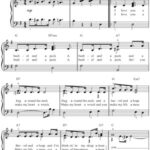For many, the iconic opening chords are instantly recognizable, but the title often remains elusive. Is it “Teenage Wasteland”? While that phrase is powerfully chanted within the song, the actual title is “Baba O’Riley.” This isn’t just a rock anthem; it’s a complex piece with roots in spiritual exploration, experimental music, and a visionary, albeit unrealized, rock opera. Let’s delve into the fascinating story behind the Baba O’Riley song by The Who.
The name itself is a blend of influences deeply personal to Pete Townshend, The Who’s guitarist and primary songwriter. “Baba” refers to Meher Baba, the Indian spiritual guru who profoundly impacted Townshend’s life and philosophical outlook. Meher Baba’s teachings emphasized love, compassion, and the illusory nature of the material world. The second part, “O’Riley,” pays homage to Terry Riley, a pioneering minimalist composer whose innovative use of repetitive patterns and electronic sounds captivated Townshend. The keyboard sequences and sonic textures in “Who’s Next,” the album featuring “Baba O’Riley,” are direct results of Riley’s musical influence. Townshend envisioned the song as a musical embodiment of Meher Baba’s spirit channeled through the lens of Terry Riley’s style – hence, “Baba O’Riley.”
Originally, “Baba O’Riley” was conceived as a cornerstone of Lifehouse, Townshend’s ambitious follow-up to the rock opera Tommy. Lifehouse was a sprawling multimedia project, envisioned as a futuristic rock opera exploring themes of societal breakdown and spiritual salvation. The narrative was set in a dystopian England, ravaged by pollution, where a group of individuals seeks transcendence through a revolutionary concert experience. In this context, “Baba O’Riley” was intended to be sung by Ray, a Scottish farmer who gathers his family to embark on a journey to London, seeking this transformative event. Townshend described Ray’s family as part of a community escaping the wasteland, ordinary people, including farmers and rebellious youth, journeying through a desolate landscape.
The “Teenage Wasteland” refrain, far from being the song’s title, actually reflects a darker, more poignant dimension of its meaning. Pete Townshend later revealed that the phrase was also inspired by his observations at the Woodstock Festival. While Woodstock is often romanticized as a symbol of peace and love, Townshend witnessed a chaotic scene, marked by drug use and a sense of youthful desolation amidst the massive gathering. He saw “Teenage Wasteland” as a commentary on the paradox of a generation seeking liberation but potentially finding itself lost and aimless. The powerful chant becomes a stark acknowledgment of this disillusionment, even within a celebratory anthem.
Despite being written for Lifehouse, when that project was shelved, “Baba O’Riley” found its place as the opening track of The Who’s seminal 1971 album, Who’s Next. While released as a single in some European countries, it primarily gained traction as an album track in the United States and the United Kingdom, quickly becoming a stadium rock staple.
The song’s musical arrangement is as iconic as its title mystery. The synthesized opening, initially created on a Lowrey organ, is instantly recognizable. The driving rhythm, powerful vocals by Roger Daltrey, and instrumental interplay contribute to its anthemic quality. Notably, the song’s coda features a violin solo (often replaced by a harmonica solo in live performances by Daltrey), which is intentionally based on Indian classical music, further underscoring the song’s connection to Meher Baba and Townshend’s spiritual explorations.
In conclusion, “Baba O’Riley” is far more than just “Teenage Wasteland.” It’s a multifaceted song, born from personal spirituality, musical experimentation, and a grand, unrealized artistic vision. It captures both the energy of youthful rebellion and a sense of deeper philosophical inquiry, making it a timeless and enduring rock masterpiece that continues to resonate with audiences worldwide.

